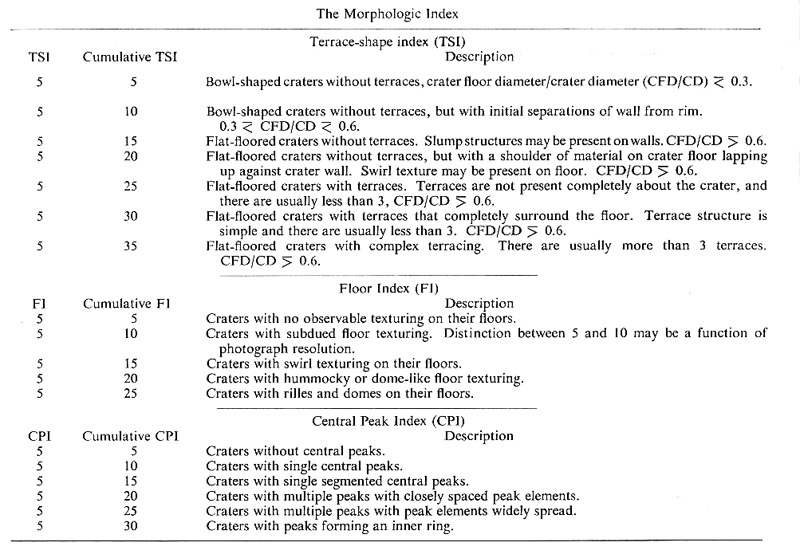Difference between revisions of "Smith and Sanchez, 1973"
| Line 2: | Line 2: | ||
=18= | =18= | ||
(glossary entry)<br /> <div id="toc"> | (glossary entry)<br /> <div id="toc"> | ||
| − | + | <br /> | |
| − | |||
==Description== | ==Description== | ||
Gene Smith and Anthony Sanchez defined a '''Morphology Index''' (MI) based upon a numeric classification of crater walls, central peaks and floors. This is functionally equivalent to classifying craters into the types defined by [[Wood%20and%20Anderson%2C%201982|Wood and Anderson, 1982]]. MI increases with crater diameter as craters change from simple to complex shapes.<br /> MI and its components are given in the Moon WIki for the few hundred craters cataloged by Smith and Snachez and '''Smith and Hartnell (1978)'''<br /> <br /> | Gene Smith and Anthony Sanchez defined a '''Morphology Index''' (MI) based upon a numeric classification of crater walls, central peaks and floors. This is functionally equivalent to classifying craters into the types defined by [[Wood%20and%20Anderson%2C%201982|Wood and Anderson, 1982]]. MI increases with crater diameter as craters change from simple to complex shapes.<br /> MI and its components are given in the Moon WIki for the few hundred craters cataloged by Smith and Snachez and '''Smith and Hartnell (1978)'''<br /> <br /> | ||
| Line 13: | Line 12: | ||
Smith, EI and AG Sanchez (1973) Fresh lunar craters: Morphology as a function of diameter, a possible criterion for crater origin. ''Modern Geology'', 4, 51-59.<br /> Smith, EI and JA Hartnell (1978) Crater size-shape profiles for the moon and mercury: Terrain effects and interplanetary comparisons. ''Earth, Moon, and Planets'', 19, # 4, 479-511. [http://www.springerlink.com/content/w0785mv1q8q045tw/ Abstract]<br /> <br /> | Smith, EI and AG Sanchez (1973) Fresh lunar craters: Morphology as a function of diameter, a possible criterion for crater origin. ''Modern Geology'', 4, 51-59.<br /> Smith, EI and JA Hartnell (1978) Crater size-shape profiles for the moon and mercury: Terrain effects and interplanetary comparisons. ''Earth, Moon, and Planets'', 19, # 4, 479-511. [http://www.springerlink.com/content/w0785mv1q8q045tw/ Abstract]<br /> <br /> | ||
---- | ---- | ||
| − | + | </div> | |
Latest revision as of 17:52, 15 April 2018
18
(glossary entry)
Description
Gene Smith and Anthony Sanchez defined a Morphology Index (MI) based upon a numeric classification of crater walls, central peaks and floors. This is functionally equivalent to classifying craters into the types defined by Wood and Anderson, 1982. MI increases with crater diameter as craters change from simple to complex shapes.
MI and its components are given in the Moon WIki for the few hundred craters cataloged by Smith and Snachez and Smith and Hartnell (1978)
Additional Information
MI is the addition of scores for TSI + FI + CPI.
TSI - Terrace-Shape Index - the form of crater terraces/slumps and the crater floor diameter / crater diameter (CFD/CD).
FI - Floor Index - floor texturing.
CPI - Central Peak Index - morphology and number of central peaks.
This table shows the scoring for each index.
LPOD Articles
Bibliography
Smith, EI and AG Sanchez (1973) Fresh lunar craters: Morphology as a function of diameter, a possible criterion for crater origin. Modern Geology, 4, 51-59.
Smith, EI and JA Hartnell (1978) Crater size-shape profiles for the moon and mercury: Terrain effects and interplanetary comparisons. Earth, Moon, and Planets, 19, # 4, 479-511. Abstract
